The herculean task of reporting elections in post-conflict Liberia
Liberia is set to head to the polls this fall. It’s the second time Liberians will vote in general and presidential elections since the end of the civil wars that devastated the country from the late 80’s until 2003 and left hundreds of thousands dead.
Liberian media is still very weak, and the post-election violence in neighbouring Ivory Coast is a stark reminder of how much is at stake in fragile democracies.
As Liberia’s Press Union President, Peter Quaqua, wrote recently: “the media in Liberia has the herculean task of reporting the processes related to these elections in the most responsible, ethical and professional manner. How well we report the news will definitely determine the public’s response to issues arising from the polls.”
Moreover, Quaqua urged journalists to do the right thing by the public and not to surrender their agenda setting responsibility to politicians.
For more insight into Liberia’s media in the run up to the elections we spoke to Peter Quaqua at the recent Global Media Forum.
Interview by Barbara Gruber
Asian media execs brush up their leadership skills in Bonn
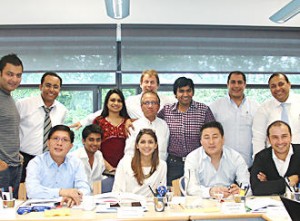 “Change management” was the catchphrase for 13 media managers from eight North African and Asian countries who attended a management training workshop in Bonn this summer. The participants discussed ways to organize transition at their respective stations. By using techniques like role play, they practiced communicating their decisions in a professional way. The training also highlighted cooperation and conflict in teams, group dynamics and key aspects of human resource development.
“Change management” was the catchphrase for 13 media managers from eight North African and Asian countries who attended a management training workshop in Bonn this summer. The participants discussed ways to organize transition at their respective stations. By using techniques like role play, they practiced communicating their decisions in a professional way. The training also highlighted cooperation and conflict in teams, group dynamics and key aspects of human resource development.
The Asian participants came from Bangladesh, Pakistan, Philippines and Mongolia. Besides visiting DW’s facilities and attending the Deutsche Welle Global Media conference ahead of the workshop, their action-packed schedule included a visit to German public broadcaster WDR in Cologne. A lively exchange with that station’s director of human resources topped off the week.
In this video, project manager Patrick Benning takes us inside the week-long workshop that was taught by DW-AKADEMIE trainer Achim Toennes. Participants Sarmad Palijo of Pakistan and Mat Verano Pareja of the Philippines describe their impressions of the visit to Germany.
Producing compelling African stories
Turn around and you will find a story to tell. That’s what DW-Akademie’s new journalism training project African Stories is all about: African journalists telling African stories and taking a closer look at their society.
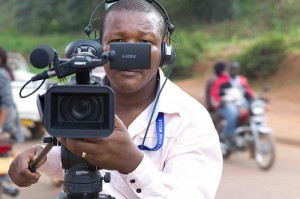 In short, the project aims to train journalists to produce interesting and professionally produced TV reports and documentaries – offering their audience an African perspective on a number of issues ranging from environmental protection, economic development and governance to poverty reduction, health and education.
In short, the project aims to train journalists to produce interesting and professionally produced TV reports and documentaries – offering their audience an African perspective on a number of issues ranging from environmental protection, economic development and governance to poverty reduction, health and education.
African Stories is also ambitious in scale involving broadcasters from across the continent. Television stations participating in the project send a production team to attend a two-week training course. The reports produced by each team during the training are in turn made available to all of the participating broadcasters.
To give you a better idea of the project, here are some stories produced during the recent workshop in Kampala in June.
![]() read more
read more
Creating Asian guidelines for user-generated content
The Asian tsunami of 2004 and the Japanese earthquake and tsunami this year were two occasions where broadcasters around the globe relied heavily on user-generated content (UGC). They aired videos people had taken with their mobile phones, pictures snapped with digital pocket cameras or they simply broadcast information users had sent in via e-mail or as text messages from remote places.
These days, many radio and TV stations encourage their audiences to contribute material to their broadcasts. This gives them access to footage professional crews couldn’t otherwise get – or couldn’t get that quickly. And it gives the audience a voice, creating a two-way conversation with the broadcasters and making people feel like the broadcaster is there for them, picking up their stories and addressing their concerns.
Making the most of user-generated content
But how can broadcasters safeguard the quality and suitability of such content? After all, it’s supplied by regular listeners or viewers: amateurs, not trained journalists. Citizen reporters haven’t necessarily been taught the journalistic basics every professional has learned, like how to research facts, how to report accurately and how to be fair to all sides.
![]() read more
read more
Médecine naturelle et mères abondonnées – Histoires Africaines au Maroc
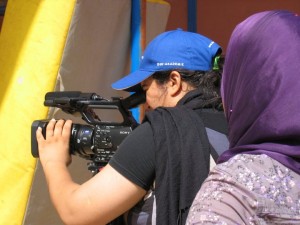 La première partie de notre grand projet “Histoires africaines – Reportages TV” (African Stories – read more in English) vient de se terminer. Neuf participants venant du Maroc, d’Algérie et de Tunisie y ont participé pendant les deux dernières semaines de juin. L’atelier s’est déroulé dans les locaux de l’ISIC (Institut Supérieure d’Information et de Communication), à Rabat au Maroc. Au cours de cet atelier, les participants ont travaillé en équipes nationales. Chaque équipe consistant en un opérateur, un monteur vidéo et un journaliste. Les trois membres de chaque équipe ont collaboré étroitement en effectuant ensemble le travail de recherche, la conception et la réalisation du reportage (du tournage jusqu’à la rédaction du manuscrit).
La première partie de notre grand projet “Histoires africaines – Reportages TV” (African Stories – read more in English) vient de se terminer. Neuf participants venant du Maroc, d’Algérie et de Tunisie y ont participé pendant les deux dernières semaines de juin. L’atelier s’est déroulé dans les locaux de l’ISIC (Institut Supérieure d’Information et de Communication), à Rabat au Maroc. Au cours de cet atelier, les participants ont travaillé en équipes nationales. Chaque équipe consistant en un opérateur, un monteur vidéo et un journaliste. Les trois membres de chaque équipe ont collaboré étroitement en effectuant ensemble le travail de recherche, la conception et la réalisation du reportage (du tournage jusqu’à la rédaction du manuscrit).
![]() read more
read more
Overcoming stereotypes
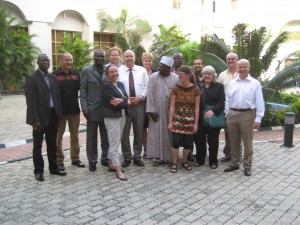 A group of Nigerian journalists met with a group of German journalists in Abuja, Nigeria. The purpose: learn more about the others’ country and discuss the existing perception of Germany and Nigeria.
A group of Nigerian journalists met with a group of German journalists in Abuja, Nigeria. The purpose: learn more about the others’ country and discuss the existing perception of Germany and Nigeria.
Germans drink a lot of beer, are self-confident and ecological while Nigerians are loud, tall and full of energy. Cliched stereotypes you might say? Perhaps, but discussing mutual stereotypes was a good starting point for the recent German-Nigerian Media Dialogue in Abuja, and cause for heated discussion and a lot of laughter among the participating journalists.
![]() read more
read more
Reporting the mutinies and civil unrest in Burkina Faso
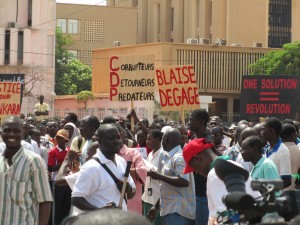 Journalists in Burkina Faso have faced difficult, dangerous and unpredictable conditions this year covering military mutinies, looting as well as civil unrest. The country has been gripped by a series of crises for several months. At least seven people including a young girl were killed when pro-government forces of President Blaise Compaoré quashed a mutiny in Bobo Dioulasso over May and June. This followed an earlier mutiny of soldiers in April. As a result of this violence, President Compaoré sacked top leaders of the military as well as his prime minister. The mutinies were preceded by violent student demonstrations in February. The protestors demanded justice after the killing of a university student in Koudougou, in the central-west of the country. Five police officers were charged with beating the student to death.
Journalists in Burkina Faso have faced difficult, dangerous and unpredictable conditions this year covering military mutinies, looting as well as civil unrest. The country has been gripped by a series of crises for several months. At least seven people including a young girl were killed when pro-government forces of President Blaise Compaoré quashed a mutiny in Bobo Dioulasso over May and June. This followed an earlier mutiny of soldiers in April. As a result of this violence, President Compaoré sacked top leaders of the military as well as his prime minister. The mutinies were preceded by violent student demonstrations in February. The protestors demanded justice after the killing of a university student in Koudougou, in the central-west of the country. Five police officers were charged with beating the student to death.
![]() read more
read more
Eastern Europe meets Africa
 Take young journalists from Eastern European countries, bring them together with experienced journalists from Africa and give them the chance to produce stories together. That’s East4South in a nutshell but it’s an interesting media project on many levels.
Take young journalists from Eastern European countries, bring them together with experienced journalists from Africa and give them the chance to produce stories together. That’s East4South in a nutshell but it’s an interesting media project on many levels.
The journalists first meet for an initial workshop in Brussels. Here, they discuss their perceptions of each others country and examine intercultural reporting. And, importantly everybody finds a team partner for the reporting trip in Africa.
After one week in Brussels, the participants go back to their respective homes to get ready for the big project. About three months later each team meets in the home country of the African partner and begins producing their TV features, radio reports or articles.
Two participants really clicked together. Christian Katsuve Kamate is from DRC and works for a local radio station in Bukavu. He teamed up with Katarzyna J. Kowalska who is from Poland and works for Polish national television. After their first meeting in Brussels they agreed on a topic for a film: the life of an ex-child soldier, moreover – a female child soldier. For both of them, the work experience left a lasting impression. We caught up with them during their post-production at DW’s studios in Bonn.
![]() read more
read more
Interviews, talkshows and reporting Zambia’s elections
Although an official date has not yet been announced, Zambia is well and truly in the grip of election fever. Presidential and parliamentary elections are due to be held before October.
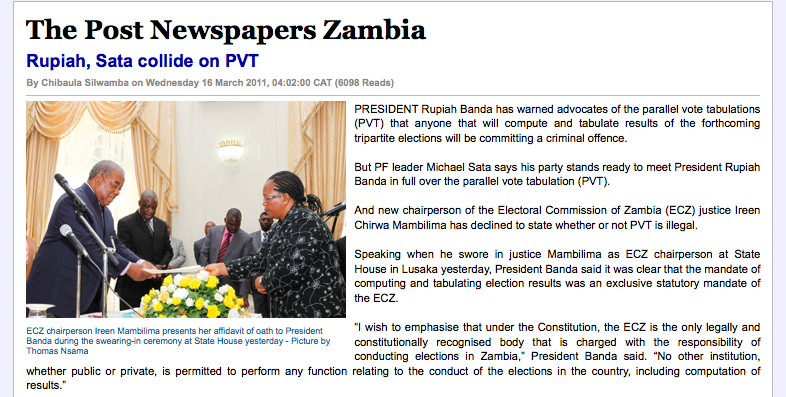
Newspapers, both state-owned and private, scream the election promises of politicians. Talk radio programs are full of the opinions of voters and TV news bulletins of the national broadcaster offer generous campaign coverage of the incumbent President, Rupiah Banda.
Strike up a conversation in a taxi in the capital Lusaka, and at some point, talk with the driver will invariably turn to politics and what is good for "the people".
It was against this background of elections that the DW-Akademie conducted a training course in Lusaka with radio journalists on Interviews and Talkshows. And, it wasn't any surprise that our participants wanted to explore political themes, develop their skills to interview politicians and discuss ways to improve talkshow programming during the election campaign.
![]() read more
read more
Interview and Talkshow training – get the basics right and listen
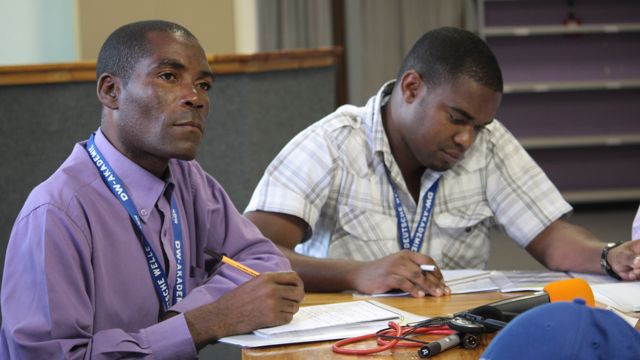
Interviews can be daunting and challenging for young journalists – especially if they are broadcasting live or moderating a talkshow dealing with controversial topics. In this guest blog post, Carsten von Nahmen, Head of the DW-AKADEMIE Africa Team, offers some insight on getting the basics right.
![]() read more
read more




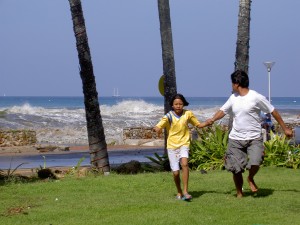
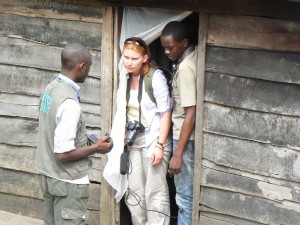




Feedback